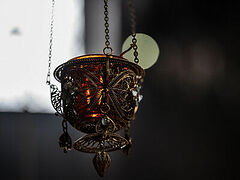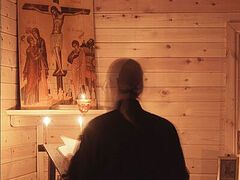Remember St. Silouan of Mt. Athos, who saw Christ before him when he had reached his limit, when he had already plunged into hell, and said to God:
“Lord, Thou art ruthless!”
Or, in other words:
“I can’t do anything to bend You. You’re a barrier in front of me. You don’t come to help me. You’re merciless. I’m ‘dried up,’ and You don’t see me.”
It’s a terrible state when you feel like you can’t move forward anymore. Do you know what this means? Have you ever reached such a state? God forbid! But, on the other hand, we have to come to this state. We will find ourselves in this state—there’s no other option, and we have to come through it. But it’s really hell, torment, the emptiness of darkness—thick, tangible darkness, and you feel its arms; indeed, there is no consolation there. But if a man can find the strength to appeal to God, then the Lord will immediately answer him:
“I’m here.”
This is an opportunity for human salvation; this is blessedness for those who are persecuted for Christ’s sake; this is the mystery of everything that is happening around us today, which grieves us and forces us to abandon everything that surrounds us.
Therefore, Christ doesn’t allow us to be lovers of money. Why shouldn’t we be lovers of money? So as not to take comfort in money. It’s not money that’s to blame, but greed. It’s not the man, not our brother who is to blame, but the passion. Passion is what tears a man’s mind away from God and binds it to something else. That is, he turns money, fame, knowledge, health, children, his wife, into idols—they all become graven images, replacing the presence of the Living God. And then the Lord comes, waves His hand, and smashes the idols. However, when the idols are broken, we, the idolaters, cry; we weep, we suffer, unable to bear it, because something terrible has happened to us.
And then it’s time for God.
This had to happen; we shouldn’t have, we can’t live and communicate with idols; we’ll overcome this when we establish a relationship with God, and then we will rediscover everything that we had “broken” before. Then we’ll establish good relations with our wife, with our husband, with our children, with our money, with our knowledge, with our position, with everything we have. Everything is “broken” and revived again, recreated on a very sturdy foundation by the Life-Giver Christ. Then comes freedom. The mind and heart are connected with God, and everything else exists in the proper hierarchy.
In any case, we have to learn to allow this good surgical intervention of the Good Doctor—God. Fear not! May the Lord work in your hearts. Fear not! No matter what happens to us, no matter what torments we endure, we can call upon God’s help. It’s like calling the ambulance on the phone. You call the ambulance, and they come. What’s the emergency number in Cyprus? 100? No, 199.
Did I tell you the story about an Athonite monk? In the desert, in the Skete of St. Anna lives Geronda Modestos. He’s a simple monk but full of spiritual zeal. And then one day, as he was passing the Church of Hagia Sophia in Thessaloniki, he saw some funeral wreaths there. In Greece, they present very expensive wreaths to the departed, and if the departed was rich, then they buy many such wreaths for him. The church is decorated with flowers and streamers, and you think the church has been decorated to celebrate the Sacrament of Marriage. You’d never even think there are funeral homes where they sell such wreaths—but now we have them in Cyprus too.
Today, everything is bought and done at the funeral home, and then we look at the deceased through the hearse window, or don’t even see them at all. You don’t have direct communication with departed loved ones today. They used to dress the deceased at home, preparing them for their final journey; we kissed them, showed respect for them. But today they lie in a coffin, and we look at them through the window of a hearse.
Elder Modestos saw the flowers and exclaimed:
“Is a young couple getting married here?”
“No, they’re having a funeral!”
“And what is all this?”
“It’s wreaths for the deceased.”
“How much do they cost?”
“5,000 drachmas for one wreath.”
“5,000 drachmas for one wreath? But that’s vanity. It’s a waste; it’s not right!”
“But what can we do, Geronda? We can’t change our customs…”
He went into the church.
“Where’s the widow?”
The grieving widow stood opposite the Elder. He asked her:
“What is this? What are you doing? All this burdens the human soul? What’s with this egotism and vanity?!”
He continued to talk, and she, the poor thing, said with pain in her heart:
“Leave me alone! Go away!”
“Why should I leave? I came to tell you to repent and think about your husband!”
Hearing these words of Elder Modestos, the widow screamed:
“I can’t take it anymore! Call 100!”
The Elder didn’t know what this number meant and he said:
“You can call 1,000!”
This is the story that happened with this Athonite elder. When he returned to Athos, he told us about it. He also smashed a sculpture in Athens. He went to the Ministry of Education, where someone told him there was a nude statue of Aphrodite in front. He asked indignantly:
“In front of the Ministry of Education?!”
The Elder took a night train to Athens, saw the statue, and was horrified.
He returned to Mt. Athos and said:
“It’s a disgrace…”
The next day, Elder Modestos grabbed a crowbar and got on a train. He returned to Athens early in the morning and broke the statue of Aphrodite with this crowbar. However, this statue was an archaeological monument and so they arrested him and wanted to try him. The judge asked him:
“Do you need a lawyer?”
“No!”
“Do you realize you’re facing a prison sentence?”
“Your Honor, I live in the desert, on the rocks. At least in prison I’d get some bread and soup!”
“A year and a half in prison!” the judge ruled.
“This is an outrage!” a woman in the courtroom shouted out in defense of Elder Modestos.
“An outrage? Then you’ll go to prison for six months!” the judge said.
In the end, the Elder was acquitted, declared insane, but he stayed in Athens for six months, visiting in prison the woman who had defended him. He would ask her:
“And who asked you to defend me?!”
These Athonite stories testify to the simplicity of a man who is exceptionally beautiful. When a man acts simply his powers unite internally. All the nonsense and gossip of this world disappears from his mind and he becomes like a little child. When a man acquires such simplicity he’s very calm, and he lives and acts calmly.
So if you really want to enter the space of the spiritual life, the space where the Lord grants the freedom of the Holy Spirit, and you truly want to become children of God, then don’t be afraid of sorrows. Don’t fear them, for they’re nothing great!
Only, as Christ says, for My sake, for the sake of righteousness.
And not because we’re overcome with sorrow for our own ruin, that we’re all in sin and unable to deliver ourselves from its shackles, but because we want to break out of the captivity of sin, to struggle with it. And when this struggle bears forth sorrows, we can truly see within ourselves what Christ talks about:
Rejoice, and be exceeding glad: for great is your reward in Heaven (Mt. 5:12).




